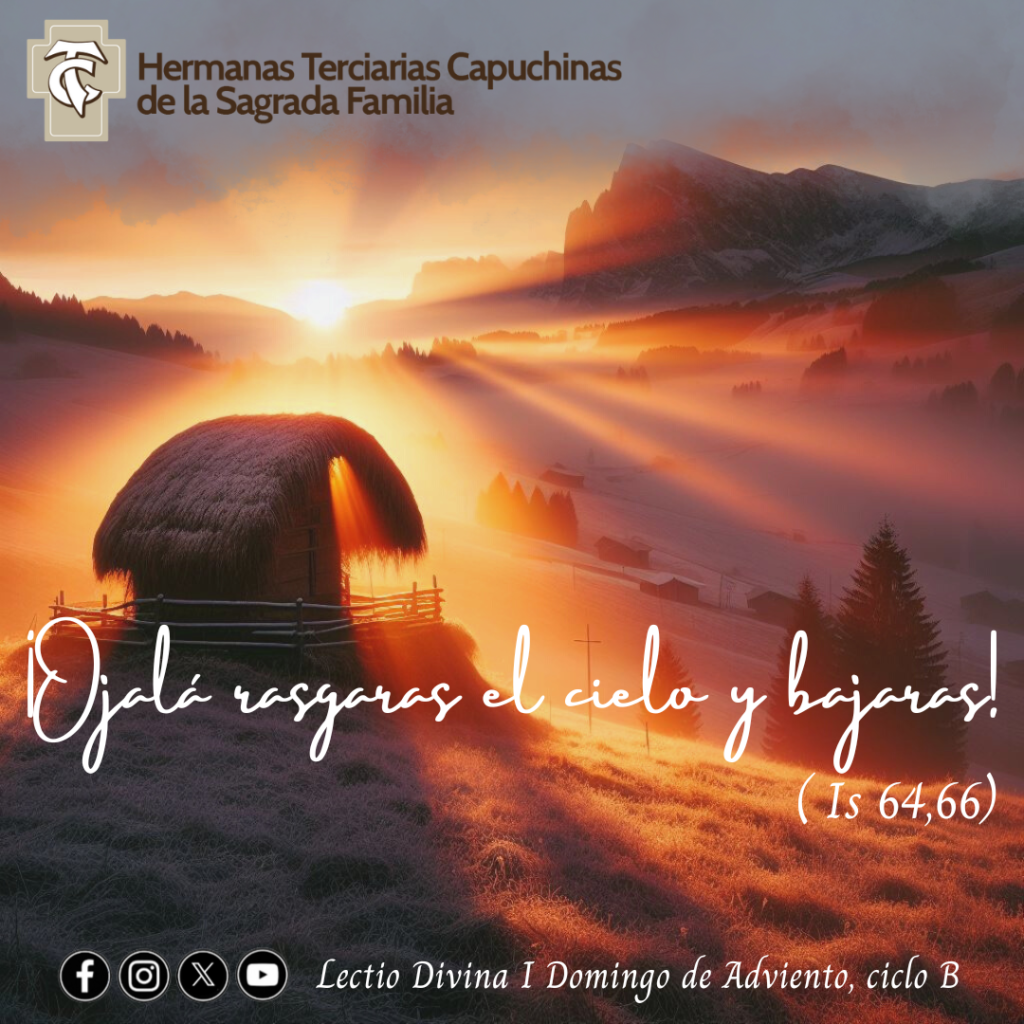Isaiah 63:16b-17.19b; 64:2b-7: Oh! that you would rend the heavens and come down!
Psalm 79: O God, restore us; let your face shine upon us and save us.
1 Corinthians 1:3-9: We await the coming of Jesus Christ.
Mark 13:33-37: Stay awake while the master of the house comes.
Today we begin a new liturgical year and with it we renew our enthusiasm and hope.
What better word can define Advent than hope?
Who has not felt that the liturgy of Advent is a renewing air that fills our hearts with joy and consolation?
In the liturgy of this First Sunday of Advent we begin by placing ourselves near the end of the book of Isaiah, which is a collection of oracles of various prophets throughout the history of Israel. The passage we read today belongs to the «Third Isaiah» (Is 56-66), who lived in a difficult time of reconstruction after the exile, which is reflected in his words full of intense emotions, even weeping.
Isaiah expresses in the first reading a cry of expectation, a longing, a deep and heartfelt desire from the depths of his heart. Oh that you would rend the heavens and come down!
He represents the deepest longing of the people of Israel, to be inhabited by the Messiah, but also the voice of the prophet is revealing and questions the double standards of a people that waits and, while doing so, does not prepare the way for his arrival; contaminated by injustice, a sin totally despicable in the eyes of Yahweh, because it goes against the principles of the people, of the covenant at Sinai, of the promise to be the people of God, it goes against the covenant, not only agreed with him, but even more so among themselves.
This eschatological tinge of the first reading puts us on alert, especially if we recognize that we are that same people of his, the people of the covenant, and that we often avoid our choices of conscience by desiring his presence in our lives and transgressing the commitment to unity and justice that we have promised.
The last words of the prophet Isaiah update the first pages of Genesis. They highlight the figure of God as Father, Creator and Restorer of life: «You, Lord, are our Father»…. «You, Lord, continue to be our Father». This image renews hope: God’s coming also requires a willingness to approach him. Prayer that acknowledges pain, seeks forgiveness and sings of hope is the way to meet him. It arises from the heart with the certainty that God cares deeply about our situation and will come to us, as he has in the past. This passage has New Testament implications.
The birth of Jesus at Christmas fulfills Isaiah’s prophecy: the heavens open and, in Jesus, God meets humanity. He will come again at the end of time, as Jesus lets his followers know in the Gospel parable.
The psalmist intervenes crying out for restoration and humbly invokes God saying: «O God, restore us, let your face shine upon us and save us.
The second reading from the first letter of the Corinthians reminds us that God is faithful and that in calling us to communion with his Son he wants us to be blameless in love, assuring us that we do not lack any gift to achieve that communion. As Benedict XVI told us in his encyclical God is Love, «Love can be commanded because it has first been given.» (14)
Finally, Mark in the Gospel reminds us that preparing for the coming of the Lord requires an enduring attitude of vigilance because we do not know the day or the hour.
The verb «watch» appears in the parable for a total of four repetitions of this term. But what exactly does Jesus’ command to «watch» imply? The Greek term «gregoreo» primarily means «to be awake». However, this does not mean that the disciples cannot sleep (physically it would be impossible), in this context, the disciples must be alert and attentive to recognize the coming of the Lord at an uncertain time.
There is a call to be attentive to something deeper. Not being asleep can be expressed in this way: we must be vigilant in the darkness of history, with our whole existence concentrated on following Jesus if we wish to witness the coming of the Kingdom, for we may run the risk of forgetting him and his teachings, since he is not present in a visible way. The «watchful» servants are those who are always ready to receive him and respond.
May the Lord find us awake and directing the portion he has entrusted to us with love, dignity and justice. May our works more than our words heal all the signs of pain, contradiction and injustice in our world, those that we ourselves have provoked and those that, although we have not provoked, we can restore. Let us not forget that like Francis of Assisi and Luis Amigó, aware of their mission, we are called to be operative, proactive and driven, and above all to listen to the voice of the Lord who, through the power of his spirit, inspires each of our words and actions.
Let us celebrate the hope that fills us with certainty and drives us forward! Advent invites us to renew our confidence in the salvation that is to come, to free ourselves from disenchantment and to wait joyfully for the coming of the Lord. Through prayerful listening to the Word, let our prayer lead us to cry out, «Come, Lord Jesus!»
S. Sandra Milena Velásquez Bedoya




